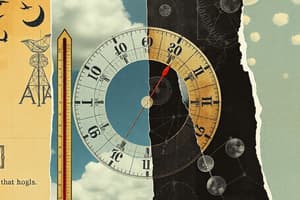Podcast
Questions and Answers
If the force applied over an area is doubled, what happens to the pressure?
If the force applied over an area is doubled, what happens to the pressure?
- The pressure is doubled. (correct)
- The pressure is halved.
- The pressure is quadrupled.
- The pressure remains the same.
What does air pressure measure?
What does air pressure measure?
- The amount of water vapor in the air.
- The weight of atmospheric gases pushing down on a surface. (correct)
- The speed of air molecules.
- The temperature of atmospheric gases.
Why is air pressure greatest at the Earth's surface?
Why is air pressure greatest at the Earth's surface?
- There is less gravity at the surface.
- The entire mass of the atmosphere lies above it. (correct)
- The atmospheric gases are less dense at the surface.
- The temperature is higher at the surface.
How does altitude affect air pressure?
How does altitude affect air pressure?
What instrument is used to measure changes in air pressure?
What instrument is used to measure changes in air pressure?
What are the two main types of barometers?
What are the two main types of barometers?
In a mercury barometer, what indicates changes in air pressure?
In a mercury barometer, what indicates changes in air pressure?
In an aneroid barometer, what causes the needle to move?
In an aneroid barometer, what causes the needle to move?
What is the standard air pressure at sea level in inches of mercury (in Hg)?
What is the standard air pressure at sea level in inches of mercury (in Hg)?
What unit of measurement is primarily used by meteorologists to describe air pressure?
What unit of measurement is primarily used by meteorologists to describe air pressure?
Which of the following is a direct consequence of air pressure?
Which of the following is a direct consequence of air pressure?
If a barometer reading shows a rapid decrease in air pressure, what weather condition is most likely to occur?
If a barometer reading shows a rapid decrease in air pressure, what weather condition is most likely to occur?
How does an increase in air temperature typically affect air pressure, assuming constant volume?
How does an increase in air temperature typically affect air pressure, assuming constant volume?
What happens inside an aneroid barometer cylinder when air pressure increases?
What happens inside an aneroid barometer cylinder when air pressure increases?
If you move a mercury barometer from sea level to the top of a mountain, what will happen to the height of the mercury column?
If you move a mercury barometer from sea level to the top of a mountain, what will happen to the height of the mercury column?
Why do airplanes need to pressurize the cabin when flying at high altitudes?
Why do airplanes need to pressurize the cabin when flying at high altitudes?
What is the relationship between air pressure and boiling point of water?
What is the relationship between air pressure and boiling point of water?
If a mercury barometer displays a height of 760 mm, what is the approximate air pressure in inches of mercury?
If a mercury barometer displays a height of 760 mm, what is the approximate air pressure in inches of mercury?
What is the impact of air pressure on weather patterns and forecasting?
What is the impact of air pressure on weather patterns and forecasting?
If standard air pressure is 1,013 mb, what does a reading of 980 mb suggest about the likely weather conditions?
If standard air pressure is 1,013 mb, what does a reading of 980 mb suggest about the likely weather conditions?
Flashcards
Pressure Definition
Pressure Definition
Force acting on a set area OR the amount of force acting on a specific area.
Air Pressure
Air Pressure
Pressure caused by the weight of atmospheric gases pushing down on the Earth's surface or any object in the atmosphere.
Air pressure at sea level
Air pressure at sea level
Earth's atmosphere at sea level exerts a pressure equal to 14.7 pounds per square inch.
Air Pressure vs. Altitude
Air Pressure vs. Altitude
Signup and view all the flashcards
Barometer
Barometer
Signup and view all the flashcards
Mercury Barometer Measurement
Mercury Barometer Measurement
Signup and view all the flashcards
Mercury Barometer changes
Mercury Barometer changes
Signup and view all the flashcards
Aneroid Barometer
Aneroid Barometer
Signup and view all the flashcards
Aneroid Barometer cylinder
Aneroid Barometer cylinder
Signup and view all the flashcards
Inches of Mercury (in Hg)
Inches of Mercury (in Hg)
Signup and view all the flashcards
Millibars (mb)
Millibars (mb)
Signup and view all the flashcards
Standard Air Pressure
Standard Air Pressure
Signup and view all the flashcards
Study Notes
- Air pressure part 1
What is Pressure?
- Pressure is a force acting on a set area.
- Pressure is the amount of force acting on a specific area.
- Pressure is calculated by Force / Area.
What is Air Pressure?
- Air pressure results from the weight of atmospheric gases pushing down on the Earth’s surface.
- Air pressure can affect any object in the atmosphere.
- At sea level, Earth's atmosphere exerts a pressure of 14.7 pounds per square inch.
How Air Pressure Changes
- Air pressure is greatest at the surface because the entire mass of the atmosphere lies above.
- Air pressure decreases as altitude increases.
How is Air Pressure Measured?
- A barometer measures changes in air pressure.
- There are two main types of barometers: Mercury and Aneroid.
Mercury Barometer
- Changes in air pressure are measured by changes in the height of the column above mercury in the dish.
- As air pressure increases, the mercury column rises.
- As air pressure decreases, the mercury column falls.
Aneroid Barometer
- The barometer is a cylinder with an internal spring, from which all air is removed creating a vacuum.
- A needle and gauge on the outside connects to the spring to show changes in air pressure.
- Air pressure changes cause the cylinder to change shape.
- An increase in air pressure compresses the cylinder and spring, causing the needle to move clockwise.
- A decrease in air pressure expands the cylinder.
Units to Measure Air Pressure
- In the United States, air pressure is measured using inches of mercury (in Hg) or millibars (mb).
- Inches of mercury (in Hg) measures the height of the mercury column in a mercury barometer.
- Millibars (mb) are used on an aneroid barometer.
- Meteorologists use millibars (mb) in forecasting and describing weather.
- Standard air pressure at sea level is 29.92 in Hg or 1,013 mb.
Activities
- Go to the Clever portal and choose the ThinkLink app (BLUE COLOR).
- On FOSS Web, select “view details” for the Weather and Water Second Edition module.
- Scroll down and select "Inv. 3: Air Pressure and Wind”.
- Open the sub-menu, scroll down and choose “Gas in a Syringe”.
- Click on "Show Pressure Gauges” and “Show Surrounding Air”.
- Run the animation several times and complete the items using this animation.
Studying That Suits You
Use AI to generate personalized quizzes and flashcards to suit your learning preferences.




